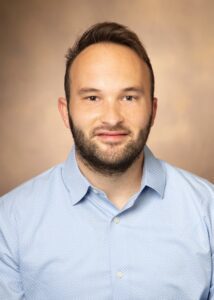Posted By: The American Journal of Human Genetics, AJHG
Each month, the editors of The American Journal of Human Genetics interview an author of a recently published paper. This month, we check in with Colby Tubbs, PhD to discuss his recent paper “Identifying deleterious noncoding variation through gain and loss of CTCF binding activity.”

AJHG: What motivated you to start working on this project?
CT: Early in my graduate training, I found myself pivoting from experimental biology to computational research in an environment that excelled in statistical genetics. This provided a fascinating intersection of disciplines where I was ultimately drawn toward studying regulatory variation using a population-genomics perspective. When I began this project, I was struck by the vast amount of data on CTCF binding and the relatively limited understanding of the functional impact of its disruption in human disease. This remains a really interesting dichotomy for me.
AJHG: What about the paper/project most excites you?
CT: The widespread availability of large-scale genomic and genetic data to the public is super exciting and drove all the work in this paper. The scale of the data, its easy accessibility, and our access to computing resources really allowed us to implement an approach that may not have been viable 5 or 10 years ago.
AJHG: Thinking about the bigger picture, what implications do you see from this work for the larger human genetics community?
CT: One striking finding from this project was the relatively high level of constraint we detected on the loss of CTCF binding in gnomAD. This really stood out to me, given how little we know about this class of variation. My hope is that our work will inspire further large-scale genetic analyses of regulatory variants while laying a foundation for future studies specifically focused on the role of CTCF binding in human disease.
AJHG: What advice do you have for trainees/young scientists?
CT: Seek community and network! I know I won’t be the first to suggest this, but I’ve learned time and again just how essential these elements are for finding both professional fulfillment and exciting career opportunities. If I could redo my training, I would place as much emphasis on building these connections as I did on developing my technical skill set.
AJHG: And for fun, tell us something about your life outside of the lab.
CT: We have a very goofy bulldog named Hank, who was by my side for many of the analyses in this paper. Outside of the lab, my family and I (Hank included, of course) love going on adventurous hikes within and around Middle Tennessee!
Colby Tubbs, PhD, is a Postdoctoral Research Fellow in the Ruderfer Lab at Vanderbilt University Medical Center.
